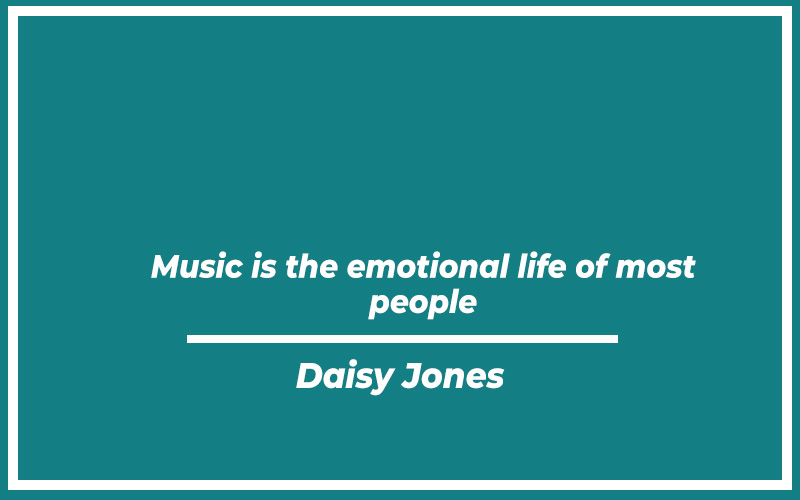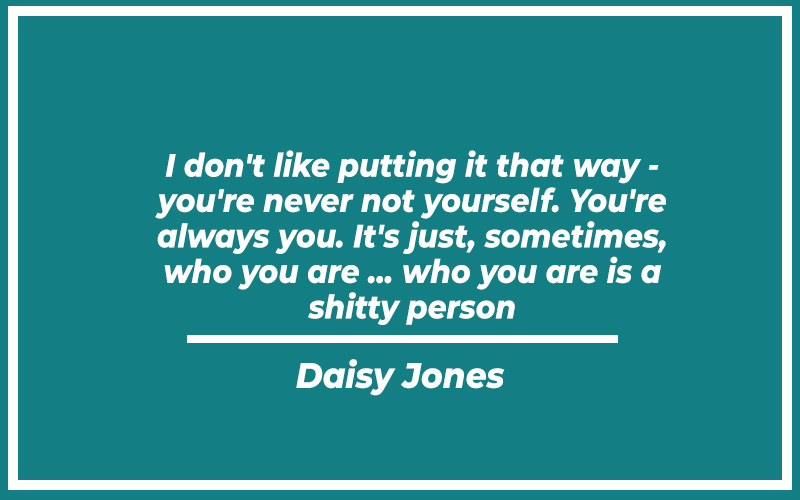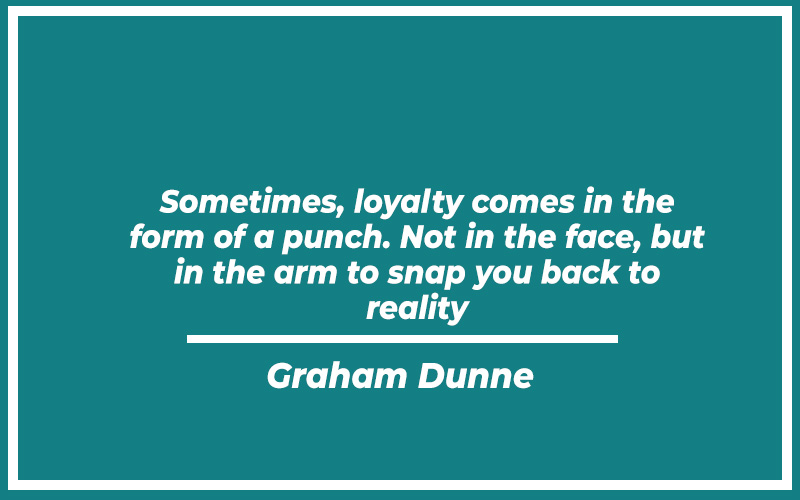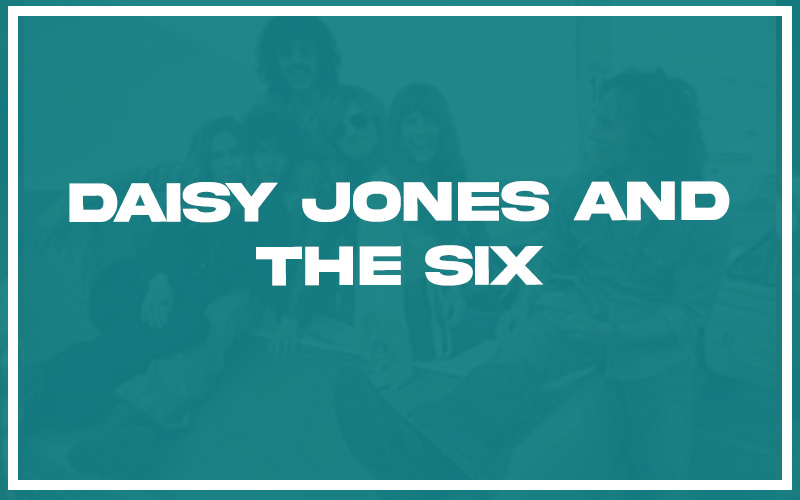When you dive into the world of “Daisy Jones & The Six,” the quotes from this novel resonate with a raw, rock-and-roll truth that’s hard to shake off.
These lines capture the highs and lows of fame, the complexities of creative partnerships, and the tumultuous personal journeys of the characters.
Each quote is steeped in the emotional intensity of the music scene of the 70s, echoing the personal and professional dramas that unfold. As you explore these quotes, they might stir something deep within you—perhaps a longing for a past era or a reflection on your own passions and struggles.
Best Daisy Jones and The Six Quotes

“Music is the emotional life of most people.” – Daisy Jones
Daisy Jones’s quote expresses the profound role music plays in human emotion, suggesting that for many, music is deeply intertwined with their emotional life. It reflects the idea that music is not just background noise but a core component of our emotional expression and experience.
By stating music is the “emotional life,” Daisy implies that music can comfort, inspire, and even heal, making it essential to human existence. This view elevates music from mere entertainment to a vital, almost spiritual element of life that resonates deeply within our emotional selves.
Also Read: Demon Quotes (with Explanation)
“Creating something that lives—that stays with you after you’ve created it—that’s the closest thing to magic I know.” – Billy Dunne
Billy Dunne equates the enduring nature of artistic creation to magic, highlighting how art continues to influence and inspire long after its creation. This quote speaks to the mystical quality of creating something that outlasts its creator, emphasizing the lasting impact of art on both the creator and the audience.
Dunne’s perspective sheds light on the transcendent power of art, suggesting that through creation, individuals tap into something larger than themselves—a legacy that remains vibrant and alive, enchanting those who interact with it across time.
“Songs are like tattoos. You never know the power of the ink on your body until you’ve done it.” – Daisy Jones
Daisy Jones likens the impact of songs to the permanent mark of tattoos, suggesting that both create lasting impressions that one might not fully anticipate until they experience them.
This analogy underscores the personal and indelible impact of music, akin to the way tattoos mark meaningful moments or stories on the body. The quote explores the notion that just as tattoos are deeply personal and significant, songs too can hold profound emotional power, embedding themselves into the fabric of our lives.
“Art doesn’t come from happiness; it comes from a deep well of pain and confusion.” – Graham Dunne
Graham Dunne’s statement sheds light on the often turbulent origins of art, suggesting that it often emerges not from joy but from suffering and perplexity. This perspective challenges the romantic notion of art as a product of divine inspiration, presenting it instead as a means of grappling with life’s complexities.
Dunne’s insight reflects the therapeutic role of art in processing and expressing the artist’s deepest struggles, offering both the creator and the audience a way to confront and perhaps understand their own pains and confusions.
“When you connect with music, you feel alive. When you create music, you give that feeling to others.” – Eddie Loving
Eddie Loving articulates the revitalizing power of music, both in its creation and consumption. This quote highlights the reciprocal nature of musical engagement, where the act of creating music not only enriches the creator’s life but also animates the lives of others.
Loving suggests that music serves as a conduit for shared human experience, fostering a communal connection that transcends individual differences, and imbuing a sense of aliveness that is both personal and collective.
“A song can hold you together when nothing else can.” – Karen Sirko
Karen Sirko highlights the unique sustaining power of music during times of emotional fragmentation. This quote suggests that songs possess an almost mystical ability to provide support and cohesion when life feels most unstable.
Sirko’s insight acknowledges the therapeutic and stabilizing role of music, which can act as an emotional glue, holding individuals together through its rhythms, lyrics, and melodies during their most challenging moments.
“You don’t make art out of good intentions. You make it out of raw necessity.” – Daisy Jones
Daisy Jones emphasizes that the impetus for creating art often stems from a deep-seated need rather than a simple desire to do good. This quote suggests that art is a fundamental expression of the artist’s inner world, driven by an urgent need to communicate and externalize what cannot be contained.
Jones’s perspective highlights the visceral, compelling nature of artistic creation, which is often born out of intense personal necessity, making it a vital, almost inevitable aspect of the artist’s existence.
“Passion is…it’s fire. And fire is great, man. But we’re made of water. Water is how we keep living. Water is what we need to survive.” – Billy
Billy uses the elements of fire and water as metaphors to illustrate a crucial life balance. Fire represents passion, which can be exhilarating and powerful, but also potentially destructive if not controlled. Water, on the other hand, symbolizes the essentials needed for survival—like family and stability—which nurture and sustain us over time.
This quote emphasizes the importance of prioritizing what truly sustains us, even when passion feels overwhelmingly compelling. It serves as a reminder that while chasing our desires, we must not neglect the fundamental needs that keep us grounded and alive.
“I used to care when men called me difficult. I really did. Then I stopped. This way is better.” – Daisy
Daisy reflects on her evolution from valuing others’ perceptions to embracing her own self-worth, particularly in the face of gendered criticism. Her journey from concern to indifference highlights a liberating shift towards self-acceptance and empowerment.
This quote speaks to the societal challenge women often face when they assert themselves—being labeled difficult. Daisy’s dismissal of this label underscores a powerful rejection of restrictive norms, advocating for women to define their value independently of derogatory stereotypes and to find greater personal satisfaction in doing so.
“The truth often lies, unclaimed, in the middle.” – Daisy
Daisy captures the complexity of truth, suggesting it often resides in a neglected middle ground between extremes. This quote challenges the binary thinking that dominates
many aspects of society, advocating for a more nuanced understanding of situations.
The idea that the “truth” is not purely one thing or another but a blend that requires deeper examination, invites individuals to consider multiple perspectives before forming conclusions. It emphasizes the value of moderation and balance in our judgments and beliefs, highlighting the often overlooked wisdom in compromise and the middle path.
“Life is about who is holding your hand and, I think, whose hand you commit to holding.” – Daisy
Daisy’s quote emphasizes the significance of relationships and mutual support in defining the quality of life. It suggests that life’s true value comes not from individual achievements or material possessions, but from the connections we foster and maintain.
By focusing on the hands we hold and those who hold ours, Daisy highlights the importance of commitment and support in personal relationships. This perspective invites us to reflect on the people we choose to support and those who support us, underscoring the profound impact these relationships have on our well-being and happiness.
“History is what you did, not what you almost did, not what you thought about doing. And I was proud of what I did.” – Billy
Billy reflects on the nature of legacy and the importance of actions over intentions. This quote underscores the difference between merely thinking about or planning things and actually executing them. It encourages taking decisive actions that reflect one’s true intentions and values.
Billy expresses pride in his actions, suggesting a satisfaction that comes from living authentically and making tangible impacts. This statement serves as a reminder of the power of action in shaping our histories and defining our lives, urging us to move beyond contemplation to actualization.
“It’s funny. At first, I think you start getting high to dull your emotions, to escape from them. But after a while you realize that the drugs are what are making your life untenable, they are actually what are heightening every emotion you have.” – Daisy
Daisy discusses the paradoxical effect of drug use, initially sought to numb emotions, only to find it amplifies them instead. This quote delves into the deceptive nature of drugs as a coping mechanism and the harsh reality of addiction that escalates the very struggles one hopes to escape.
It highlights the vicious cycle where the solution becomes the problem, exacerbating emotional pain and making life more challenging. The insight offers a poignant reflection on the complexities of addiction and recovery, emphasizing the importance of confronting rather than avoiding emotional realities.
“Art doesn’t owe anything to anyone. Songs are about how it felt, not the facts.” – Daisy
Daisy asserts the independence of artistic expression, emphasizing that art is not obligated to conform to factual accuracy but should instead convey the emotional truth of the creator. This quote champions the subjective nature of art, where the value lies in its ability to resonate emotionally with the audience rather than its adherence to objective truth.
It encourages artists to prioritize personal expression over external expectations, highlighting art’s role as a medium for sharing individual perspectives and emotions, thereby enriching the human experience through empathy and understanding.
“Nothing I wouldn’t do/to go back to the past and wait for you.” – Billy
Billy expresses a deep sense of regret and longing in this quote, reflecting on missed opportunities and the desire to change the past. This sentiment captures the universal human experience of wishing to alter previous decisions or actions in the face of current knowledge.
The poignancy of the statement lies in its recognition of the irreversible nature of time and the emotional weight of longing for different outcomes. It speaks to the heartache associated with love and loss, and the often painful wish to rewind and correct the course of events.
“It’s the ones who never loved you enough that come to you when you can’t sleep.” – Camila
Camila’s observation touches on the haunting presence of unfulfilled relationships in our quietest moments. This quote explores the paradox of human connections where those who may have caused us pain are also the ones we find ourselves thinking about during moments of vulnerability.
It suggests a complex interplay of desire, memory, and emotional attachment that continues to affect us, highlighting the enduring impact of past relationships on our emotional well-being.
“I’m not saying that I didn’t care. I cared a lot. I’m saying that when you really love someone, sometimes the things they need may hurt you, and some people are worth hurting for.” – Billy
Billy discusses the sacrifices often inherent in loving someone deeply. This quote reflects the complexities of love, where personal pain can be a consequence of another’s needs.
It suggests that the measure of love can sometimes be gauged by the willingness to endure pain for the sake of another’s happiness or well-being, emphasizing the selfless aspect of love that prioritizes the needs of loved ones over personal comfort.

“I don’t like putting it that way – you’re never not yourself. You’re always you. It’s just, sometimes, who you are … who you are is a shitty person.” – Daisy
Daisy challenges the notion of inconsistent identities, asserting that our actions, good or bad, are always reflective of our true selves. This quote encourages personal accountability, urging us to acknowledge that our worst moments are as much a part of us as our best.
It prompts introspection about the nature of self and the importance of owning all aspects of our personality, suggesting that growth and improvement are contingent upon accepting our flaws.
“People say it’s hard to be away from the people you love but it was so hard to be right next to him.” – Camila
Camila captures the intense difficulty of proximity in strained relationships. This quote explores the emotional challenge of being physically close to someone while feeling emotionally distant or disconnected.
It highlights the complex nature of relationships where physical closeness can sometimes exacerbate feelings of emotional isolation, suggesting that true connection requires more than mere physical presence.
“Here’s a lesson for everybody, take it from me: Handsome men that tell you what you want to hear are almost always liars.” – Daisy
Daisy offers a cynical but cautionary perspective on charm and deception. This quote warns against the allure of superficial traits and smooth talkers, suggesting that those who readily say what we want to hear may not always have sincere intentions.
It speaks to the broader theme of skepticism in personal relationships and the importance of discerning genuine character over appealing exteriors.
“Art doesn’t owe anything to anyone. Songs are about how it felt, not the facts.” – Daisy
Daisy asserts the independence of artistic expression, emphasizing that art is not obligated to conform to factual accuracy but should instead convey the emotional truth of the creator. This quote champions the subjective nature of art, where the value lies in its ability to resonate emotionally with the audience rather than its adherence to objective truth.
It encourages artists to prioritize personal expression over external expectations, highlighting art’s role as a medium for sharing individual perspectives and emotions, thereby enriching the human experience through empathy and understanding.
“Every note doesn’t just tell a story. It screams it.” – Warren Rhodes
Warren Rhodes’ quote captures the intense emotional impact of music, emphasizing that each note in a song doesn’t just passively convey a story—it actively declares it with force. This perspective invites listeners to appreciate music as a powerful form of communication that goes beyond mere entertainment, offering a visceral experience that can stir deep emotions and provoke thought.
The implication here is that music, when listened to with intent, can be as expressive and impactful as the most eloquent words, screaming its truths into the hearts of its audience.
“In every lyric, every chord, lies the truth of the universe, if you listen closely enough.” – Daisy Jones
Daisy Jones suggests that music holds universal truths, encapsulated within its lyrics and melodies. This quote encourages a deeper engagement with music, proposing that it offers insights into life’s broadest questions and deepest mysteries.
The idea here is not just that music is a reflection of the artist’s thoughts, but that it is a mirror of universal human experiences, accessible to those who are willing to listen deeply and interpret what they hear. It portrays music as a key to understanding more about ourselves and the world around us.
“You find out who your real friends are not when you make a mistake, but when you survive it.” – Daisy Jones
Daisy Jones articulates that true friendships are proven in the aftermath of challenges, not merely during active crises. This quote speaks to the resilience required in friendships, emphasizing that a friend’s value is shown by their presence and support as one recovers and rebuilds.
It suggests that enduring support, rather than mere sympathy during adversity, marks true friendship. This perspective shifts the focus from the moment of mistake to the longer, often harder period of recovery, highlighting the importance of sustained support in defining genuine relationships.
“Loyalty isn’t grey. It’s black and white. You’re either loyal completely, or not loyal at all.” – Billy Dunne
Billy Dunne’s quote presents loyalty as an absolute, unambiguous commitment. This strict view of loyalty suggests that there is no middle ground in being loyal; one is either fully committed or not at all. It challenges the notion of partial or conditional loyalty, advocating for a definitive stance in relationships.
This perspective can be both empowering and demanding, urging individuals to consider the depth of their commitments and to strive for unwavering support and faithfulness in their interactions.
“Friends are the family you choose. You don’t just give up on them when things get tough.” – Camila Dunne
Camila Dunne emphasizes the chosen nature of friendship, likening it to family. This quote highlights the voluntary aspect of friendship and the associated commitment to endure through challenges together. It advocates for perseverance and loyalty within these chosen relationships, suggesting that true friends are treated with the same unconditional support as family members.
This perspective underscores the importance of loyalty and steadfastness in friendships, viewing them as deep, enduring bonds that should not be easily forsaken.
“It’s the friends you can call up at 4 a.m. that matter.” – Eddie Loving
Eddie Loving identifies true friendship as being available during the most inconvenient times. This quote underscores the importance of reliability and presence, suggesting that the true measure of friendship is not found in frequent social interactions but in being available during moments of dire need.
It highlights the significance of friends who offer support without hesitation, regardless of the hour or circumstance, emphasizing that such availability is a true testament to the depth and sincerity of a friendship.

“Sometimes, loyalty comes in the form of a punch. Not in the face, but in the arm to snap you back to reality.” – Graham Dunne
Graham Dunne metaphorically describes loyalty as sometimes requiring tough love—actions that might be momentarily painful but are intended to help. This quote suggests that true loyalty involves not just supporting someone’s choices unconditionally but also being willing to intervene in a way that might be uncomfortable if it is in the person’s best interest.
It advocates for a form of loyalty that is active and sometimes challenging, emphasizing that genuine care for another involves guiding them towards the best possible outcomes, even if it requires difficult conversations or actions.
Also Read: Lash Quotes (with Explanation)
Final Thoughts
Reflecting on quotes from “Daisy Jones & The Six” can be a vivid reminder of the power of music and storytelling to express and evoke deep emotions. These lines aren’t just about the characters’ journeys; they’re about the universal themes of love, loss, and ambition.
Let these quotes inspire you to chase your dreams with the same fervor and to confront your challenges with resilience.
Whether it’s a lyric from a song or a poignant dialogue, the words of Daisy Jones and her bandmates offer a compelling glimpse into a world where art meets life head-on.

